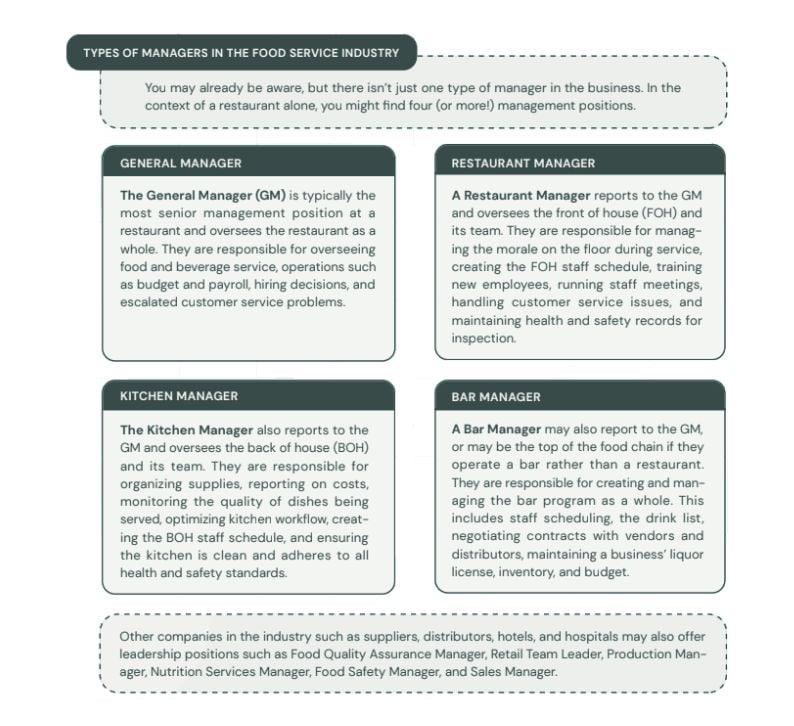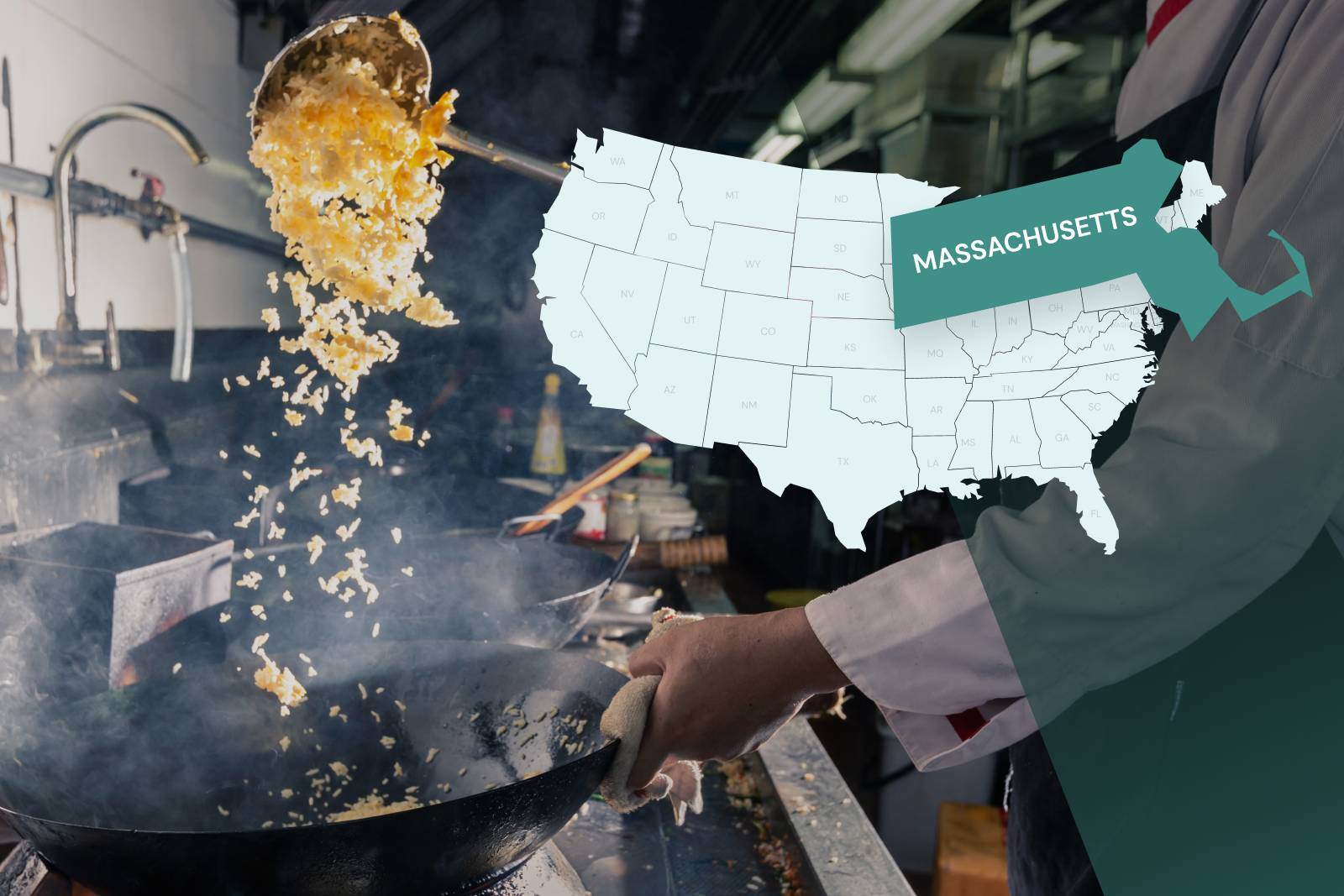Restaurant Dive says it just right: the on-premise dining experience isn’t dying–it’s evolving.1 Along with that evolution comes a much-needed change in how workers in the foodservice industry are perceived.
Slowly, but surely, the idea that foodservice jobs are for teenagers just starting out in the workforce has faded, and more people are viewing the industry as a true profession deserving of respect.
Whether you’re thinking about joining the foodservice industry for the first time, rejoining the ranks after a break, or feeling stuck in your current position, there are many ways to approach a career in food service. And thankfully, the fast-paced nature of the industry allows you to experiment with different responsibilities and explore new opportunities.2
Let’s look at some of the pathways toward career advancement in the foodservice industry. Chances are, there are all kinds of opportunities in food service that haven’t even crossed your mind! We’ll show you how to get there.
Getting started: entry-level positions in foodservice
Moving up: intermediate-level positions
Going all in: management positions
Non-traditional careers in foodservice
Finding the right career in foodservice
Developing your career in foodservice–whatever that career might be!
Getting started: entry-level positions in foodservice
There are quite a few positions to choose from when you’re just getting started in the foodservice industry. Let’s look at some of the responsibilities required for each position.
Host/Hostess
Hosts have the all-important responsibility of making a good first impression on customers. Hosting requires a chipper attitude for greeting guests, organizational skills for managing reservations and seatings, and patience in order to maintain exceptional customer service.
Busser
Bussers are responsible for clearing dirty dishes from tables and making sure the front-of-house stays clean. Bussing tables requires efficiency because it impacts the customer experience as well as the ability to seat new customers. It also requires quick reflexes in order to prevent collisions and spills, as well as speedily clean up any messes on the floor.
Server
Servers have many responsibilities, but the most important is tending to the immediate needs of the customer. Serving requires time management, attentiveness, and proper communication skills–not to mention heroic levels of multitasking.
Back of House/Expo/Line Cook
Back-of-house workers are responsible for preparing food and keeping the kitchen clean and safe. Back-of-house staff are equally as important for keeping the restaurant sanitary and running smoothly.
Outside of the restaurant setting, you can find entry-level work in foodservice as a Cafeteria Associate at a hospital or health system, a Food Service Assistant at a high school or university, or a Food Service Attendant at an assisted living facility.
Moving up: intermediate-level positions
In a traditional restaurant, fast casual, or quick-service restaurant business, the next step up typically involves taking on more responsibility and, in some cases, some additional training or certifications.
Shift Leader/Floor Leader
The titles of these positions vary by organization, but the responsibilities are pretty similar. Shift leaders are responsible for supporting their teammates, helping managers train new staff, and making sure that a particular shift’s side-work, prep, and/or additional cleaning has been completed. Managers also count on leads to help set an example for best practices when it comes to food safety, food allergy policies, and customer service.
Bartender
Bartenders have a highly specialized skill set, and many states require additional safety training for people who step behind the bar. If you’re interested in becoming a bartender, let your manager know that this is a goal and start researching what your city, county, and state requirements are. Many front-of-house and back-of-house staff already have parts of the drink menu memorized from their time spent with the company so far, so it actually saves the business some time and money to help you along your journey!
It is important to note that many of the mid-level roles that exist outside of the restaurant industry require some more specific training or education. If you’re looking for a mid-level foodservice position outside of the restaurant, you may want to consider a lateral move to another entry-level position in your desired setting and then ask your managers what the best course of action would be to reach your goals.
Going all in: management positions
Let’s say you’ve been in the industry for a while, and you’re looking for a new challenge. You know how a well-run restaurant SHOULD operate on the day-to-day and you want to help make things run more smoothly for the business you work for. These are some pretty clear signs you are ready to move on up the ladder into management. But what does that look like?

Signs of readiness for a managerial role
If you’re thinking about moving up to a managerial role in food service, first of all-congratulations! It’s an exciting move that undoubtedly will offer you opportunities for higher pay, more experience, and of course, more responsibilities.
But how do you know you’re ready to take on those new responsibilities (and challenges)?
Here are a few telltale signs:
-
You’re a natural problem-solver: As a food service manager, you’ll be responsible for handling a wide range of issues, from staffing challenges to customer complaints. If you find yourself constantly coming up with creative solutions to overcome obstacles, you may have the natural problem-solving skills that successful managers need.
-
You love working with people: Whether you’re managing a staff of restaurant servers, chefs, or bartenders, it’s essential to be able to work well with people. If you truly enjoy helping and supporting others, and you’re able to communicate clearly and effectively, you may have the interpersonal skills needed to succeed as a foodservice manager.
-
You’re organized and detail-oriented: Foodservice businesses are complex operations. As a manager, you’ll need to juggle responsibilities ranging from budgeting and scheduling to menu planning and vendor relationships. If you excel at multitasking, are able to keep track of multiple deadlines, and are detail-oriented enough to catch small errors, you may be ready to take on the challenge of a foodservice management role.
-
You have a deep understanding of the industry: Successful foodservice managers need to have a deep understanding of the industry, including trends, regulations, and best practices. If you’ve been working in the foodservice industry for a while, you likely have built up a strong foundation of knowledge that will serve you well in a managerial role.
-
You’re able to remain calm under pressure: In the fast-paced, high-stress environment of a foodservice operation, managers need to be able to remain calm and level-headed in even the most challenging situations. If you’re able to keep your cool under pressure and work well under tight deadlines, you may be ready for a foodservice management position.
-
You have a strong work ethic: Managing a foodservice operation requires a high level of dedication and hard work. If you’re committed to doing whatever it takes to ensure the success of your business, and you’re willing to put in long hours and a lot of effort, you may be ready to take on the challenge of a managerial role.
Most importantly, successful foodservice managers need to be highly motivated. If you’re someone who sets big goals for yourself, takes initiative, and is always looking for ways to improve yourself and your business, you may be ready to take the next step and become a manager.
Remember, to move up to a managerial role, you’ll need to have a solid understanding of the food industry, from front-of-house to back-of-house, and even the current trends and best practices. If you’re not feeling quite confident in this area, check out all of Trust20’s resources and consider investing some time in training.
Responsibilities of a Foodservice Manager
As you prepare to step up to the next level in your career, it’s important to understand the responsibilities that come with this new role. So what exactly should you expect?
Each role will vary, but in general, a foodservice manager is responsible for overseeing the day-to-day operations of a restaurant, cafeteria, or other foodservice establishment. This includes everything from menu planning and ordering supplies to managing staff and ensuring customer satisfaction.
Those are the responsibilities that you’re probably already aware of, but believe it or not, the work of a foodservice manager goes beyond that.
For example, in a managerial role, you might be expected to develop and implement operational policies and procedures. This might involve setting up a system for taking inventory, establishing protocols for food safety and sanitation, or creating a training program for new staff. Don’t forget about hiring staff, scheduling shifts, and supervising daily operations!
Another important aspect of the job is financial management. You’ll likely be responsible for creating and managing budgets, tracking expenses, and analyzing financial data to make informed decisions about pricing, promotions, and other business strategies.
Customer service is another key area of focus for foodservice managers. You’ll need to ensure that customers are greeted, seated, and served in a timely and friendly manner and that any complaints or issues are addressed promptly and professionally.
Finally, you’ll also need to be able to work effectively with vendors and suppliers. This might involve negotiating contracts, coordinating deliveries, and resolving any issues that arise with regard to product quality or availability.
All in all, this is a multifaceted role that will require you to call upon a variety of skills and competencies–so make sure you’re interested in these kinds of responsibilities before you apply for a managerial role.
What to do if you’re interested in becoming a Manager
If you’re an industry veteran, you already know how the day-to-day should run. Taking on the responsibilities of a shift lead is a great first step, but you should also make it known to your current manager that you’re interested in becoming a manager down the line. Start paying attention to the opening and closing procedures, as well as the questions you hear your current manager asking of you and your teammates.
You can also get started by investing in continuing education for yourself with a Food Allergy Certificate or by volunteering at a local soup kitchen, nursing home, or food bank. Continuing education advances your own personal knowledge, but it also shows your boss that you’re serious about taking on more responsibility at work. It is also worth it to start investigating what your state's training requirements are for managers.
Non-traditional careers in foodservice
We get it–not everyone wants to be the head chef or manager in a high-end or trendy restaurant. And that’s okay! There are plenty of career options that will allow you to put your education and passion to good use. Read on for some examples of “out of the box” careers in foodservice you may want to consider instead.
Foodservice in healthcare
Do you have a passion for food and a desire to make a real difference in people’s lives? If so, you may want to consider foodserivce in healthcare.
Foodservice professionals in healthcare settings are responsible for preparing and serving meals to patients, residents, and staff in hospitals, nursing homes, and other healthcare communities.
These roles are not just about keeping people fed. People working in the healthcare sector must be knowledgeable about dietary restrictions, portion control, and food safety regulations. Plus, they have to be able to adapt to different culinary needs, such as pureed or soft food diets for patients with swallowing difficulties.
So, what kind of training does one need to pursue a career in foodservice in healthcare? While previous experience in food service or culinary arts is certainly helpful, many employers prefer to hire candidates who have completed a formal training program in food service, hospitality, or nutrition. Some states require foodservice workers to hold a food handler’s permit or certification in food safety.
The skills you’ll need to succeed in this field include exceptional time management, attention to detail, and excellent communication skills. You’ll also need to be able to work collaboratively with other healthcare professionals to ensure that patients’ nutritional needs are being met.
Some common job titles within foodservice in healthcare include:
-
Dietary Aide
-
Food Service Director
-
Nutrition Services Manager
If you’re looking for a caregiving component to your work, you may find positions with a more specific focus, such as a Pediatric Nutrition Specialist or a Registered Dietitian.
Again, depending on where you live, you may need to pursue additional training or certifications for some of these roles, but if this is where your interests lie, you’ll likely find the extra hours of study well worth it.
Foodservice in education
Schools, colleges, and universities all need foodservice professionals to keep their cafeterias and dining halls running smoothly.
These folks are responsible for the daily operations of their dining facilities, including menu planning, food preparation, inventory management, and ensuring timely delivery of food and supplies. They also manage staff, maintain safety and sanitation standards, and oversee budgeting and financial reporting.
Most of these jobs require a high school diploma or equivalent, though some (particularly those at the managerial level) will require formal training. If you’re already working in the food industry, you likely have many of the skills needed for a career in foodservice in education.
For example, you probably know how to manage inventory, create menus that appeal to a wide range of diners, and handle financial reporting. The main difference is that you’ll be working in an environment focused on serving students and staff rather than customers off the street.
If you’re interested in exploring a career in foodservice in education, here are some common job titles:
-
Food Service Director
-
Executive Chef
-
Food Production Manager
-
Purchasing Manager
-
Catering Manager
Food marketing and advertising
While you likely won’t be working directly with food in this kind of role, it’s still a great career option for someone who’s passionate about food but ready to get out of the kitchen.
These professionals are the masterminds behind the ads we see on TV and the promotions we see in stores. They use their knowledge of the food industry to develop marketing strategies that will make their product stand out from the rest. They might work for a specific brand, a marketing agency, or even as a freelancer.
So, what kind of training do you need to become a food marketing and advertising guru? A bachelor's degree in marketing or a related field is usually required, and some companies may prefer candidates with a background in the food industry (like you!).
In addition to formal education, it's important to stay up-to-date on industry trends and have a good understanding of consumer behavior.
Each role will vary, as you might expect, but you'll be responsible for developing marketing plans, identifying target audiences, and creating ads and promotions that appeal to consumers. You might work with a team of designers and copywriters to bring your ideas to life, and you'll need to have excellent communication skills to get everyone on the same page.
Some job titles you might see in food marketing and advertising include:
-
Marketing Manager
-
Brand Manager
-
Advertising Coordinator
-
Creative Director
These roles can be found at food companies of all sizes, from multinational corporations to small start-ups.
Food technology, innovation and research
While these professionals work behind the scenes, the work they do is critical–and it affects the lives of each and every person in the world.
So, what exactly do these careers entail? Food technologists work to develop new food products and improve upon existing ones through research and testing. They use their knowledge of ingredients, food chemistry, and food safety to create delicious and nutritious options for consumers.
Innovation specialists have similar responsibilities–they might work to bring new ideas and concepts to the forefront of the industry, staying ahead of trends and finding ways to make foodservice more diverse and inclusive. Researchers dive deep into the science behind food, studying everything from the microbiology of fermentation to the sensory perception of taste.
To pursue a career in food technology, innovation, or research, you’ll need a strong background in science, often requiring a degree in food science, chemistry, or nutrition. It’s also important to have a love for experimentation, as these roles often require a lot of trial and error in the development process.
So, how will you use these skills once you’ve entered the field? As a food technologist, you might work with product development teams to create recipes for new menu items, or ensure that food is safely manufactured and packaged. You might work on marketing campaigns or ideation sessions to find new and exciting ways to bring food to the masses.
Researchers, in particular, might work for government agencies or private companies to conduct studies on food safety, or sensory analysis of flavors.
Some potential job titles in this field include:
-
Food Technologist
-
Innovation Specialist
-
Research Scientist
-
Food Safety Manager
-
Product Development Manager
Food journalism and media
These professionals dish out the latest food trends, review restaurants, create engaging content for social media, and even host their own cooking shows! They're basically the master chefs of words and visuals when it comes to food.
To become a food journalist or media expert, you'll need to have a passion for writing and/or producing media that showcases the culinary world. Some may have a degree in journalism or communication, while others may work their way up the ladder through experience and networking. Again, foodservice experience is incredibly helpful here (and required in many cases).
Just imagine being able to craft a compelling social media post about your restaurant's new menu item or write engaging descriptions for your catering services. These skills can elevate your brand and attract a wider customer base.
As for job titles, you have a range of options, including:
-
Food writer
-
Restaurant critic
-
Food blogger
-
Food photographer
-
Food stylist
-
TV host
…and more.
Culinary Educator
As a culinary educator, your role is to teach others about foodservice practices and food safety regulations. This means you spend your days educating others on how to properly handle food, how to prepare food according to certain guidelines or regulations, and how to maintain a clean and safe environment.
To become a culinary educator, you'll want to have experience working in the foodservice industry. This could mean working as a cook, chef, or in some other capacity in a professional kitchen.
A degree in culinary arts is also beneficial for this role. However, the most important qualification is your passion for educating others. You should be comfortable in a teaching or training role and have strong communication skills. Depending on the level of students you decide to teach, you may need an education degree (or some sort of teaching certificate).
All in all, though, you’ll need to have the ability to give clear and concise instructions and the ability to remain calm under pressure. You should also have a strong understanding of food safety regulations and be committed to maintaining a high standard of cleanliness in all foodservice settings.
Some potential job titles for a culinary educator include:
-
Culinary instructor
-
Professor of culinary arts
-
Food safety trainer
-
Culinary education coordinator
Finding the right career in foodservice
As you now know, there are all kinds of sectors of the foodservice industry, ranging from restaurants, catering, and corporate dining to healthcare, education, and more. To find the right sector for you, it's important to consider your skills, interests, and personality.
Are you a person who enjoys working in a fast-paced environment? Then perhaps a job as a server or bartender in a restaurant would suit you. Do you have a passion for healthcare or nutrition? Then a career in a hospital or long-term care facility might be more your speed.
Research different careers and roles
Do your research on the different sectors and roles within the foodservice industry. Look online for job openings and descriptions to get an idea of what each career path entails. Don't be afraid to reach out to professionals in your desired field to ask them questions and gain more insight.
Maybe you've been working in a restaurant for years and are ready for a change. Switching to a new industry within foodservice can be a great way to expand your career opportunities and learn new skills. However, it's important to be prepared for the transition. Research the new industry and what it entails, and make sure you have the necessary skills and education to make the switch.
Don't limit yourself to one role or position–try out all kinds of roles to gain a better understanding of how the industry works and what each job entails. Shadow a chef, server, catering manager, bartender–whatever role interests you. This will not only help you determine which role is the right fit for you, but it will also provide you with a well-rounded understanding of the industry.
Build new skills and knowledge
The foodservice industry is constantly evolving and changing. It's important to stay up-to-date with the latest trends and skills. Take advantage of training opportunities and resources to build new skills and knowledge.
Network and make connections
Networking is key in any industry, but it's especially important in foodservice. Attend trade shows, conferences, and events where you can meet other professionals in the foodservice industry.
Get involved with local chapters of industry associations like the National Restaurant Association (NRA) or the American Culinary Federation (ACF). Join online groups and forums, and follow the social media accounts of industry leaders. Networking is a fantastic way to make connections, learn about job openings, and gain insight into the foodservice industry.
Be open-minded
Keep an open mind when searching for a career in foodservice. If you've always dreamed of being a chef in a five-star restaurant, but find yourself working in a hospital kitchen, give it a chance. You might be surprised at the fulfillment you can gain from working in the healthcare industry.
Similarly, consider employment opportunities outside of traditional restaurants, such as food trucks, catering companies, or even corporate dining. Keep an open mind, and you might just find your ideal career in an unexpected place.
Consider necessary certifications and exams
Depending on your career aspirations, you'll likely need specific certifications and exams. For example, if you're pursuing a career as an executive chef, you'll need to earn a culinary degree, or you may need to take a food safety manager exam.
Do your research to find out more about what’s required for your particular career!
Prepare for the interview
Once you've landed an interview, it's time to prepare!
Research the company and the role you're applying for so that you're informed and can ask informed questions. Make a list of your strengths, accomplishments, and experiences, and know how to articulate them in a way that demonstrates your value to the company. Dress appropriately, arrive early, and make eye contact–these small touches can make a big difference.
Respect the learning curve
Recognize that every sector of the foodservice industry has its own unique laws, regulations, policies, and best practices. Don't assume that your experience in one sector is automatically transferable to another.
Give yourself the necessary time and resources to learn and adapt. Embrace the learning curve and be open to feedback. Remember, growth comes from stepping outside of your comfort zone.
Also, keep in mind that continual learning is crucial in any industry, especially one that is constantly evolving, like foodservice.
That's where Trust20 comes in. Trust20 offers a variety of products geared towards foodservice professionals at every level of experience. Trust20's online resources provide valuable insight into best practices, food safety, customer service, and more. Whether you're just starting out in your foodservice career or looking to advance to the next level, Trust20 is an excellent resource for staying up-to-date on industry trends and best practices.
Developing your career in foodservice–whatever that career might be!
As you can see, the foodservice industry is just as complex a network of positions as any other industry. If you’re looking to advance, but none of the roles we’ve talked about in this article are available, don’t stress! This article contains an overview of SOME of the options.
Try to remember that communication will always be key to your success, and talk to your manager.3 Make it known that you’re looking to make moves to advance your career–that way, you are top of mind the next time an opportunity arises.
No matter where you start or where you’re going, you have options!
Sources:
-
Restaurant Dive: The on-premise restaurant experience isn't dying — it's evolving
-
Eater: Actually, Not Everyone Is Trying to Escape the Restaurant Industry
-
Gordon Food Service: Employees who are engaged stick around






